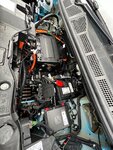- May 7, 2012
- 8,594
- 1,819
- 30,935
I am not convinced that any EV has a range we would accept. If I remember the last tow car awards there was nothing that would manage more than 135 miles and to be safe I suppose that would mean never going past 120 miles and on a bad day against a head wind even less.
Until range improves I cannot see a reason to buy an EV if towing is involved except possibly for the likes of farmers who would be doing far less mileage on a charge at the moment.
I have certainly been looking at hybrids though, as there are a few that look decent and might take the plunge at some time.
Until range improves I cannot see a reason to buy an EV if towing is involved except possibly for the likes of farmers who would be doing far less mileage on a charge at the moment.
I have certainly been looking at hybrids though, as there are a few that look decent and might take the plunge at some time.






